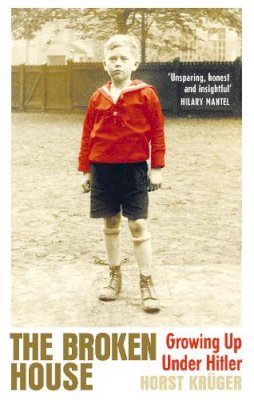

The Broken House: Growing up Under Hitler – The Lost Masterpiece
Horst Krüger
The Broken House is a rediscovered coming-of-age story that provides an unforgettable portrait of life under the Nazis.
In 1965, journalist Horst Krüger attended the Auschwitz trial in Frankfurt, where 22 former camp guards were put on trial for the systematic murder of over 1 million men, women and children.
The trial sent Krüger back to his childhood in the 1930s, in an attempt to understand 'how it really was, that incomprehensible time'. He had grown up in a Berlin suburb. Here, people lived ordinary, non-political lives, believed in God and obeyed the law, but were gradually seduced and intoxicated by the promises of Nazism. He had been 'the typical child of innocuous Germans who were never Nazis, and without whom the Nazis would never have been able to do their work'.
This world of respectability, order and duty began to crumble when tragedy struck. Step by step, a family that had fallen under the spell of Nazism was destroyed by it.
Originally published in Germany in 1966 but out of print for decades, this moving and tragic portrait of family life under the Nazis is now available for the first time to UK readers.
'The book that broke the silence... the writing glowers from the page - sorrowful, disbelieving, chastened and yet not without hope' Observer
'Extraordinary... compelling' Mail on Sunday
'Exquisitely written... haunting... Few books, I think, capture so well the sense of a life broken forever by trauma and guilt' Sunday Times
Product Details
About Horst Krüger
Reviews for The Broken House: Growing up Under Hitler – The Lost Masterpiece
Dominic Sandbrook
Sunday Times
A masterpiece. An astonishing piece of literature. Complex, heartfelt, vibrant, intense, urgent. A must read. I read it straight through to the last page and then wanted to read it all over again
Thomas Harding, bestselling author of Hanns and Rudolf The major rediscovery of a forgotten treasure. No book has ever so honestly evoked the wretched terror of life in Nazi Germany
James Hawes, author of The Shortest History of Germany I often think that the key to a successful memoir is to find the right place to stand, the effective distance. Writing in the sixties, Kruger had enough clarity to see where his story fitted into the big picture, but he can still make the reader feel the passion, danger and grief. It is an unsparing, honest and insightful memoir, that shows how private failure becomes national disaster. There is no mercy from the author and no false hope, but he fills a gap in the historical imagination
Hilary Mantel A book of hard-won simplicity and quite beautiful precision
The Times
The book that broke the silence... the writing glowers from the page - sorrowful, disbelieving, chastened and yet not without hope... The Broken House... magnificently delivers
Anthony Quinn
Observer
A fascinating and spine-chilling book
Julia Franck Extraordinary... a compelling...account
Craig Brown
Mail on Sunday
It is precisely the ordinariness of Krüger's life that makes this not just a book about Nazism and Germany but also a book for our own times... In an age when democracy is under threat everywhere...it's salutary to learn how one family, one indvidual among many, could stand by while evil triumphed... Krüger's limpid, almost poetic prose, well translated by Shaun Whiteside, conjures vivd, concrete images of the dullness of life in Eichkamp
Richard J Evans
Guardian
The Broken House... stands out for Krüger's unsparing perceptions of the past and the sharpness and eloquence of his prose... It is Krüger's tone, stark and unforgiving, sometimes almost chillingly detached, that makes this memoir so interesting
Caroline Moorehead
Times Literary Supplement


